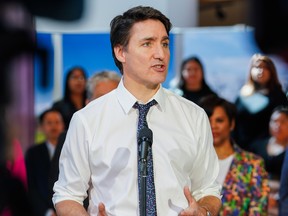Kim Moody: The capital gains inclusion rate proposal is nothing more than a revenue-generating measure
Reviews and recommendations are unbiased and products are independently selected. Postmedia may earn an affiliate commission from purchases made through links on this page.
Article content
Albert Einstein is credited with saying “the hardest thing in the world to understand is income tax.” One can debate the context of why he said that, but I tend to agree with good ol’ Albert. I have often publicly stated that taxation is one of the most complex subject areas known to man. That doesn’t mean it’s the most important, but it is one of the most complex.
One thing I have learned the hard way over my long career as a tax practitioner and specialist is that the practice of taxation inevitably involves a basic understanding of politics. As a young and new professional more than 30 years ago, I knew nothing about politics other than watching it. Naively, I thought good tax and economic policy always ruled the day. Nope, far from it. Fast forward to today and one understands that politics most often trumps good policy.
Advertisement 2
Article content
Article content
The proposal in the 2024 federal budget to increase the capital gains inclusion rate is a good example of that. The proposal to increase the inclusion rate from the current 50 per cent to two-thirds (individuals will be entitled to the 50 per cent inclusion rate for the first $250,000 of annual capital gains, but corporations and trusts do not get such a threshold) was introduced with a lot of rhetoric.
It would, apparently, apply to only 0.13 per cent of individuals — the “rich.” They were generally “old” and had “already made their money,” so they were being asked to pay a “little bit more.” The government also said the new rate was necessary to provide “intergenerational fairness.” Lately, the prime minister stated the proposal was all about “fairness.”
Last week, in an unusual move involving taxation policy, Prime Minister Justin Trudeau released a three-minute cute, but slick video that strongly defended the measure. The video was full of misleading rhetoric that basically parroted a lot of the above lines again. It has had millions of views. I put out a rebuttal video — certainly not very slick — that pointed out the errors in the messages. It has had thousands of views, not millions.
Article content
Advertisement 3
Article content
Good taxation and economic policies make a tangible difference to the well-being of Canadians. In the present case, the capital gains inclusion rate proposal is simply poor taxation and economic policy and nothing more than a revenue-generating measure.
Does a cutesy, defensive video released for political purposes, and its millions of views and “likes,” make it good policy? Of course it doesn’t, despite many who have been praising the video as “a great ‘comms’ piece.” Yes, it is, but that’s all it is. Will it garner more votes for the governing party? I guess we’ll find out.
But from a taxation perspective, the proposal disrupts the basic principle of tax integration. In other words, the average Canadian will be inclined to invest their capital individually (so as to get future access to the $250,000 threshold at 50 per cent) as opposed to a corporation or trust (which, from a non-tax perspective, may make more sense). From an economic perspective, why would an investor invest their hard-earned after-tax dollars in Canada if their taxation rates are not adjusted for the risk they take to invest?
Advertisement 4
Article content
To be clear, a wage earner, such as the nurse described in the cutesy video, does not incur risk when earning their money. An investor does. And that is the basic reason why Canada has historically given preferential treatment to capital gains-type income, as do many other countries around the world. Countries such as Canada need investors to risk their capital to start good businesses that employ Canadians. Small-business owners do that daily. So do other startups such as those in the technology industry.
Capital is very fluid and if the after-tax rates of return are better elsewhere, investors will certainly place those dollars there. The bottom line is that we need to encourage those investment dollars to stay here. We also need to quickly stem the flow of successful people who are leaving Canada and taking their investment dollars with them.
In today’s divisive world — fuelled by dopamine-inducing social media — it’s easy to have opinions about politics. Your ideology might fit nicely with your political views. You might be influenced by cutesy videos that are nothing more than influential marketing and public relations.
Advertisement 5
Article content
But let’s be clear: today’s politics is often nothing more than trying to influence voters to vote for you. It involves politicians speaking about matters they really have no expertise in and sticking to nonsensical speaking points when challenged.
I may be dreaming, but good politics should be about more. It should involve the implementation of good policy after seeking advice from sound experts, not just ones who simply agree with your ideology.
Recommended from Editorial
In 1924, then United States president Calvin Coolidge said: “No matter what anyone may say about making the rich and the corporations pay the taxes, in the end, they come out of the people who toil. It is your fellow workers who are ordered to work for the government, every time an appropriation bill is passed. The people pay the expense of government, often many times over, in the increased cost of living. I want taxes to be less, that the people may have more.”
There’s a lot of truth in that political statement and that’s a rarity by today’s standards. In the end, the proposal — and vigorous defence by our current government — to increase the capital gains inclusion rate is good politics. But very poor policy. Much of the resulting increased taxes will be paid by Canadians “who toil.”
Advertisement 6
Article content
Kim Moody, FCPA, FCA, TEP, is the founder of Moodys Tax/Moodys Private Client, a former chair of the Canadian Tax Foundation, former chair of the Society of Estate Practitioners (Canada) and has held many other leadership positions in the Canadian tax community. He can be reached at [email protected] and his LinkedIn profile is https://www.linkedin.com/in/kimmoody.
_____________________________________________________________
If you like this story, sign up for the FP Investor Newsletter.
_____________________________________________________________
Bookmark our website and support our journalism: Don’t miss the business news you need to know — add financialpost.com to your bookmarks and sign up for our newsletters here.
Article content










